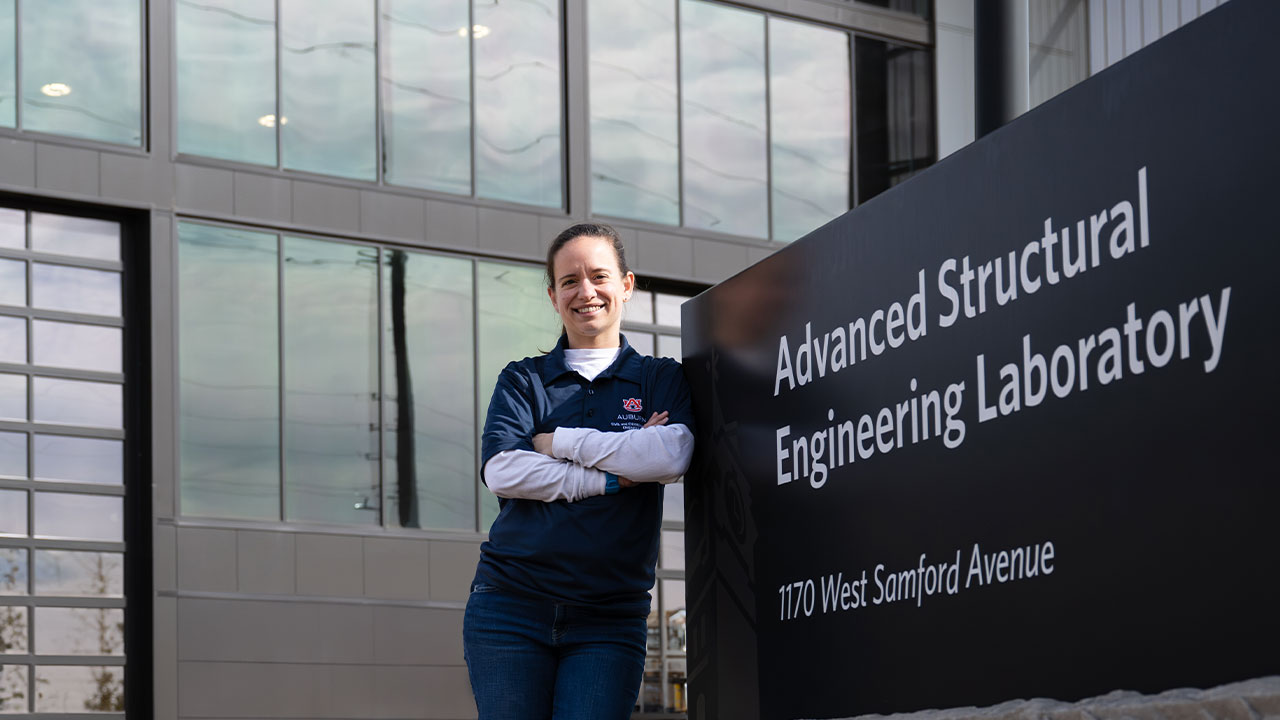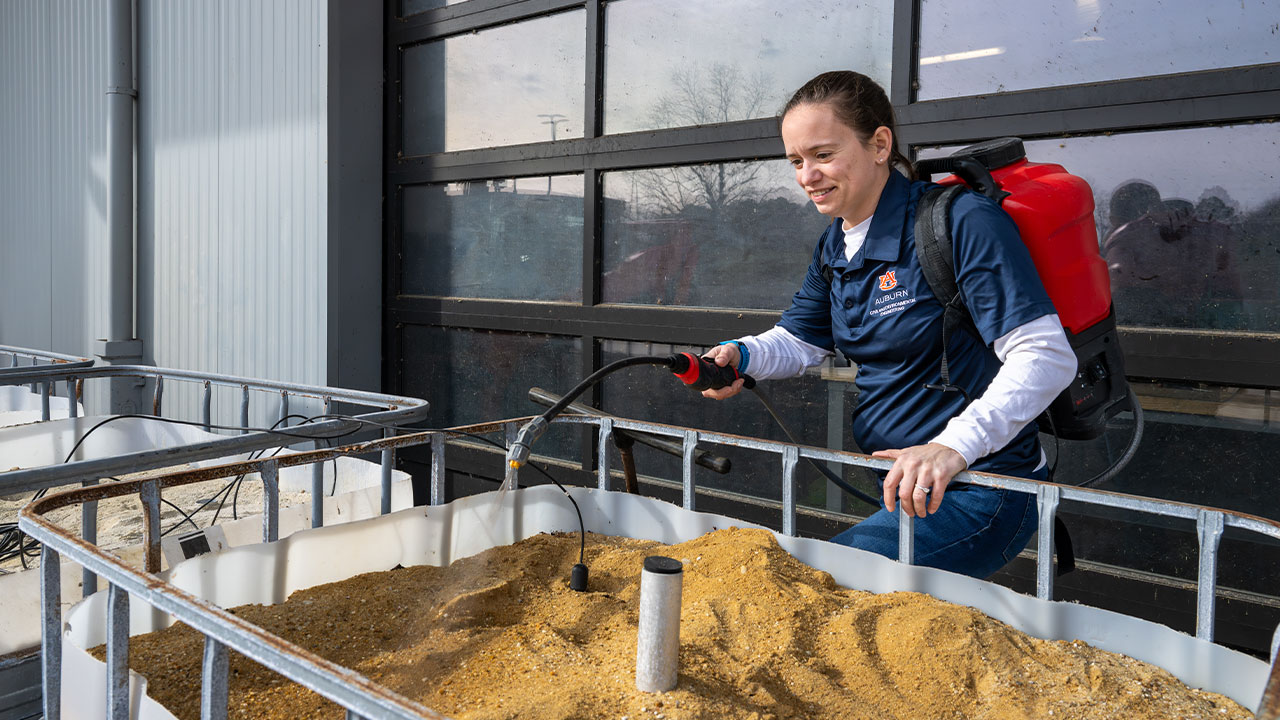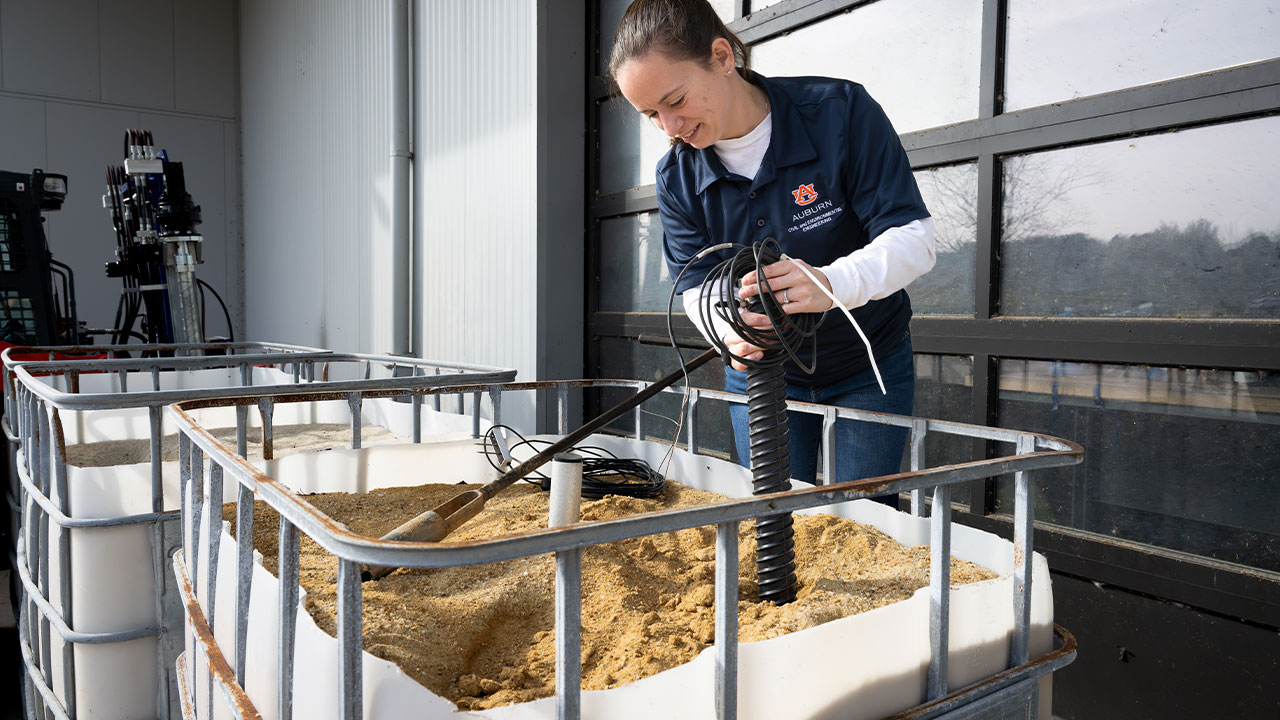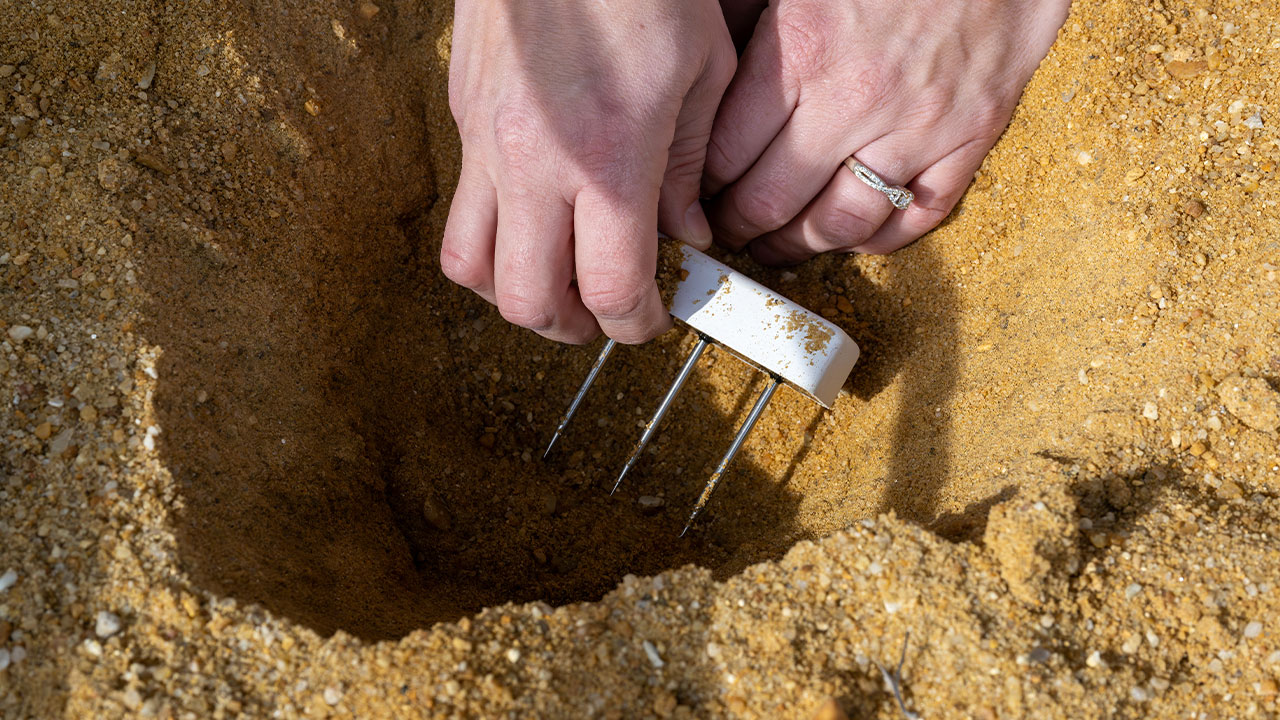content body

When Amy Diekmann completed her doctorate this past August, she became the first doctoral student at Auburn to start and finish their entire research program in the new Advanced Structural Engineering Laboratory.
Timing is everything for Amy Diekmann.
The Indiana native had never considered attending Auburn University for a doctoral degree until the Diekmann family temporarily relocated to Alabama.
Diekmann was well into a doctoral program at a different institution when, in April 2020, the family moved to Fairhope. Five months later, as Amy and her husband, Tim, welcomed a third daughter, Amy desired to transfer and complete her degree elsewhere. She applied to several schools, including Auburn.
By December 2020, Tim’s temporary job relocation was over, and the Diekmanns could live anywhere. But they were in love with the state of Alabama, and the city of Auburn was to be their new home.
That same month, Auburn’s Samuel Ginn College of Engineering unveiled its new state-of-the-art Advanced Structural Engineering Laboratory (ASEL).
“I did not know about the lab before I made the decision to transfer to Auburn,” Diekmann recalled. “I remember reading an article about the facility shortly before we moved here and being very impressed with what I read and being excited about the possibility of working there.”
Diekmann not only worked there, but when she completed her doctorate this past August, she became the first doctoral student to start and finish their entire research program in the new lab.
Coincidentally, 2023 marked 100 years of women in engineering at Auburn.
Timing.
Faculty who make a difference
Diekmann said she chose Auburn because of the research areas of the geotechnical engineering faculty, like Professor Brian Anderson and Associate Professor Jack Montgomery.
Anderson and Assistant Professor Ben Bowers would serve as her co-advisors. Coincidentally, the trio was at the University of North Carolina-Charlotte at the same time.
Timing.
Diekmann was taking master’s classes before she transferred to North Carolina State’s online engineering program where Anderson was a faculty member, and Bowers was an undergraduate student.
“I did not know them at the time, but our shared time there provided a good foundation for our relationship,” said Diekmann.
“Dr. Anderson and Dr. Bowers have been extremely supportive of me throughout my time at Auburn. I was a GTA [graduate teaching assistant] for Dr. Anderson my first semester and met Dr. Bowers the following fall semester when I started working on my research.
“Since I was a transfer student, I wanted to finish as quickly as possible, as I had already spent four years at my previous institution, but I also had the added complication of having children that require childcare. As parents themselves, they were always willing to work around my childcare schedule. They wholeheartedly wanted me to succeed. They have become mentors and friends, and we will continue to stay in touch even after I move on from Auburn.”
Timing.
Diekmann also found Auburn faculty to be a resource for life outside the classroom. She said Montgomery was always more than willing to answer class-related questions but also offered advice on the academic job search and career development. When Associate Professor Michael Perez discovered Diekmann was interested in an academic career, she said he gave her useful information on the interview process.
“When we moved to Auburn in January 2021, we knew no one,” Diekmann said. “The people at Auburn University and in the Auburn community have made us feel very welcome, and we have all made some good friends here.
“Faculty that I never even had for class were willing to answer my questions and cared enough to ask about how I’m doing and ask about my family. As a result, Auburn graduates alumni who are proud of their alma mater and willing to give back to current students.”
The ASEL
Diekmann earned a bachelor’s degree in civil engineering from the University of Evansville in Indiana, and a master’s degree in civil engineering from North Carolina State University and had not experienced anything like Auburn’s ASEL.
“The facility is huge and a little overwhelming at first, but I quickly became comfortable,” she admitted. “The state-of-the-art features have led to many different opportunities for students. It seems like something innovative is always going on.”
Located at the corner of West Samford Avenue and Shug Jordan Parkway, the 42,000-square-foot ASEL includes a high bay laboratory with a strong wall and strong floor specially engineered to handle extreme structural testing loads; a geotechnical chamber within the strong floor; a concrete materials research and testing laboratory; wind testing capabilities that can replicate hurricane-level loads; and faculty and graduate student spaces.
“My background is both structural and geotechnical engineering, so I love seeing research in both areas happening around me. The students who conduct research here are excited about their work and are always willing to discuss it,” added Diekmann.
Her own research involved laboratory testing and field installation of soil moisture sensors. As a post-doctoral fellow, Diekmann continues to work on the project highlighted in her dissertation, “Laboratory and Field Measurements of Moisture Content and Bulk Electrical Conductivity of Subgrade and Base Course Materials.”
The project, sponsored by the National Oceanic and Atmospheric Administration and the Federal Highway Administration, focuses on assessing the effects of sea level rise and coastal storms on pavement resilience.
Knowing that weather and climate impact pavement structural and functional performance, Diekmann’s work is important to find answers to minimize pavement distress for the longevity and safety of the nation’s roadways.
At the ASEL, Diekmann tested sensors she would use in the field by placing them in containers of different soil materials and adding increasing amounts of saline water. She also had to test the setup of the sensors at the ASEL as they were solar powered. Then, the sensors could be installed in the field, and she could collect data on moisture content within the pavement.
“This project will continue until at least 2025, so considerably more data will be collected before the project ends,” Diekmann said. “I will be involved with this project while I am at Auburn for sure, and hopefully, through its completion.”
Diekmann has seen the ASEL provide opportunities for both undergraduate and graduate students. Faculty are known to bring classes out for demonstrations and use undergraduate students to help on research projects.
“The ASEL is one of only a handful of facilities like it in the country, and as a result, cutting-edge research is performed here,” she said. “Faculty support graduate students’ research and encourage them to publish papers and present at conferences. It’s a tremendous learning experience.”
It’s the people
Diekmann credits all her success at Auburn to her family and Auburn faculty.
First and foremost is her husband, Tim, who likely earned Father of the Year and Best Husband Ever honors for helping manage three young girls, the family home and his own job for years, while Amy focused on homework and research.
Vast amounts of encouragement and support also came from great distances — from family in Indiana, Pennsylvania and North Carolina — and a little closer to home in Magnolia Springs, Alabama.
Diekmann is optimistic this made an impression on her daughters — Emily, 11, Sadie, 8, and Katie, 3.
“I hope they see that, if they work hard enough, they can accomplish anything,” said Diekmann. “My parents have always been super supportive of me in everything I’ve done, including academia and athletics. They never pushed my sister or me into anything. They let us pick our own paths and encouraged us to work hard to succeed.
“I’d like to see my girls follow whatever paths they choose.”
Diekmann said she found additional support outside of class and family in newfound friends and fellow runners, Erin Ball and Casey Carter. Running is second nature to Diekmann, who ran throughout middle and high school and even competed collegiately in cross country before participating in marathons and half-marathons for fun.
“We’ve run many pre-dawn miles, and they always provide a listening ear and encouragement,” she said.
Long-distance running is one way for Diekmann to cope with life’s stresses. It is a bit of passion though, as she is currently 20 marathons into a goal of running a sub-4:00 marathon in every state. For those non-runners, that means running a marathon in less than four hours.
Talk about timing.
More influencers
Diekmann worked in consulting after earning her bachelor’s, but after her oldest child was born and she earned her master’s, she switched gears and found herself as an adjunct instructor at Ivy Tech Community College and the University of Southern Indiana in Evansville.
She inadvertently found her place.
“I enjoyed interacting with and getting to know the students and sharing my engineering knowledge with them,” she recalled. “Every semester was a new group of students and a new set of challenges. I developed a desire to teach full-time, and that led me to pursue my Ph.D.
“College is such a pivotal time in a person’s life. I aspire to positively influence the next generation of civil engineers.”
Diekmann plans to use her experiences at Auburn and her newly acquired Auburn degree to do just that.







